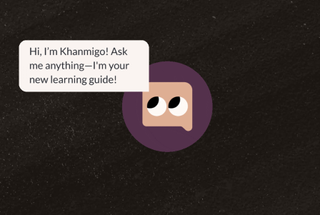Khan Academy is launching Khanmigo, a GPT-4 powered learning guide, to select educators and students.
Unlike ChatGPT, Khanmigo won’t do school work for students but will instead act as a tutor and guide to help them learn, says Sal Khan, founder of the nonprofit learning resource Khan Academy.
GPT-4 is the successor to GPT-3.5, which powers the free version of ChatGPT. ChatGPT’s developer OpenAI, released GPT-4 on March 14 and made it accessible to paid subscribers to ChatGPT. On the same day, Khan Academy launched its GPT-4-powered Khanmigo learning guide.
While Khanmigo is only available to select educators and students currently, Khan hopes to test and assess it in the coming months, and if all goes well, expand its availability.
In the meantime, here’s everything you need to know about Khanmigo .
How Did Khan Academy and Open AI Join Forces for Khanmigo?
OpenAI contacted Khan Academy last summer, well before ChatGPT became a household name.
“I was skeptical initially because I was familiar GPT-3, which I thought was cool, but I didn't think it was something that we could immediately leverage at Khan Academy,” Khan says. “But then a couple of weeks later, when we saw the demo of GPT-4, we were like, ‘Oh, this is a big deal.'”
While GPT-4 still suffered from some of the “hallucinations” that large language models can generate, it had noticeably fewer of these. It was also dramatically more robust. “It was able to do things that seemed like science fiction before that, like drive a nuanced conversation,” Khan says. “I actually think that 4, if it's prompted right, feels like it passes the Turing Test. It really feels like a caring human on the other side.”
How Does Khanmigo Differ From ChatGPT?
The free version of ChatGPT is powered by GPT-3.5. For education purposes, the GPT-4-powered Khanmigo can carry on much more sophisticated conversations, serving as a more life-like tutor for students.
“GPT-3.5 really can't drive a conversation,” Khan says. “If a student says, ‘Hey, tell me the answer,' with GPT-3.5, even if you tell it not to tell the answer, it will still kind of give the answer.”
Khanmigo will instead help the student find the answer themselves by asking the student how they arrived at that solution and maybe pointing out how they might have gone off track in a math question.
“What we're able to get 4 to do is something like, ‘Good attempt. It looks like you might have made a mistake distributing that negative two, why don't you give it another shot?' Or, 'Can you help explain your reasoning, because I think you might have made a mistake?'”
The factual hallucinations and math mistakes are much less frequent with the Khanmigo version of the technology as well. These still happen but are rare, Khan says.
What Are Some Questions About Khanmigo Going Forward?
Khanmigo can be used to help students as a virtual tutor and as a debate partner. Teachers can also access it to generate lesson plans and assist with other administrative tasks.
Part of the goal for its pilot launch will be to determine what the demand for the tutor will be and the way educators and students utilize it, Khan says. They also want to see what potential problems might arise from the technology. “We feel like there's so much value here for educators and for students, and we just don't want bad things to happen that turn people sour on all the positive things. So that's why we're being very careful,” he says.
Cost is another factor that the Khan Academy team will be studying. These AI tools require a tremendous amount of computing power, which can be expensive to generate, however, costs have been steadily decreasing and Khan hopes this trend will continue.
How Can Educators Sign Up For the Pilot Group
Educators interested in using Khanmigo with their students can sign up to join the waitlist. The program is also available to school districts that participate in Khan Academy Districts.
To share your feedback and ideas on this article, consider joining our Tech & Learning online community.

